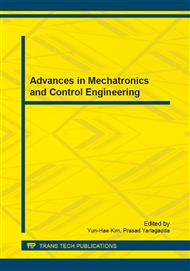p.1529
p.1533
p.1537
p.1541
p.1547
p.1551
p.1555
p.1563
p.1570
Auto Disturbance Rejection Control for Nonlinear Time-Delay Systems
Abstract:
For some nonlinear complex control objects, conventional PID control is not able to obtain satisfactory control characteristics because of its inherent defaults. As a new controller based on PID control technology, auto disturbances rejection control(ADRC) breaks through the limitation of the former technology, at the same time maintains its advantages. In this paper, these two methods are used for nonlinear object −−two-step water tank respectively. Simulation and application results prove that ADRC controller works with better adaptability and robustness when controlling the nonlinear time-delay object, and is easier to achieve the control of no-overshoot and no-static-error.
Info:
Periodical:
Pages:
1547-1550
Citation:
Online since:
January 2013
Authors:
Price:
Сopyright:
© 2013 Trans Tech Publications Ltd. All Rights Reserved
Share:
Citation:


